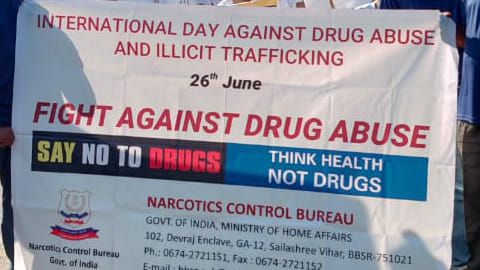New Delhi: Answering a call from Prime Minister Narendra Modi to ensure a “nasha-mukt Bharat (drug free India)”, the National Commission for Protection of Child Rights (NCPCR) has joined hands with the Narcotics Control Bureau (NCB) and released a ‘joint action plan (JAP) on prevention of drug and substance abuse among children and illicit trafficking’ Tuesday.
As part of the plan, NCPCR chairperson Priyank Kanoongo told ThePrint, children will also be part of the monitoring process. “Children will become informers, children will take accountability for ensuring the areas around their school are free of any substance abuse or tobacco shops,” he said. “By including children in this process, not only will school areas become safer spaces but an entire generation will be sensitised about substance abuse.”
Kanoongo added: “Until now, everyone in this sector was working in silos. The JAP is a 360 degree approach that has essentially streamlined practices that were already in place before.”
The Ministry of Social Justice and Empowerment (MoSJE) and the NCB compiled a list of 272 districts across the country that have been selected for comprehensive action under this plan.
Of the 272 districts, a majority of them are from Rajasthan (33), Uttar Pradesh (33), Punjab (18), Madhya Pradesh (15), Jharkhand (12), NCT of Delhi (11), Assam (9) and Bihar (8).
“Envisaged as a framework to wean away children from drug abuse and to stop selling of drugs in surrounding areas of schools/educational and child care institutions through convergent actions in a time bound manner”, the joint action plan has been implemented and aims to achieve these goals in the coming two years.
Also read: ‘Kids taken to CAA protest, homes flout Covid norms’ — FIR allegations against Mander’s NGO
Rising substance abuse among children
The move comes in the backdrop of substance abuse figures among children suggesting a worrying trend.
Tobacco, alcohol, inhalants and cannabis, respectively, are the most common substances used by children, according to a study conducted by the NCPCR and the National Drug Dependence Treatment Centre.
A 2019 study by the Ministry of Social Justice and Empowerment had concluded that 4.6 lakh children in the country were addicted to inhalants — “the only category of substance in which the prevalence was higher among children than among adults”.
NCB to coordinate efforts
The NCB’s role, according to the joint action plan, is one of coordination. “There is an overall trend of drug abuse that has been on the rise across the country. Prime Minister Narendra Modi has also expressed his concerns about this several times in Mann Ki Baat,” NCB Deputy Director General Sachin Jain told ThePrint.
“Supply detection and spreading awareness about substance abuse is something that we have already been doing,” Jain added. “We are the coordinating agency as far as the JAP is concerned. We are there to advise NCPCR about the various steps that need to be taken, inform them about the concerned ministries and authorities that should be involved etc.”
Besides the NCPCR and the NCB, authorities such as the excise department, Ministry of Health and Family Welfare, Ministry of Social Justice & Empowerment, Ministry of Education, Central Drugs Standard Control Organisation (CDSCO), Gandhi Smriti and Darshan Samiti, NCERT, police, district magistrates and child welfare police officers among others are also helping implement the action plan.
Each of the above mentioned bodies has a designated role to play. For instance, the NCERT will spread awareness while AIIMS will provide training for early detection of substance abuse among children. The social justice ministry will be responsible for setting up rehab centres in the 272 districts, and creating child-friendly spaces by the end of this financial year, Kanoongo said.
‘Children to be oriented on Gandhian principles’
A significant component of the JAP includes “provision of prahari clubs, wherein, children would be oriented on Gandhian Principles”.
Kanoongo said this will be done in collaboration with the Gandhi Smriti Darshan Samiti to ensure there are no drugs and substances in and around school premises.
“Between 20-30 students from classes 6-12 will be roped in for this from both government and private schools across the country,” Kanoongo said. As monitors of substance abuse, children can complain to school authorities who can then inform the administration and take necessary action.
Under the plan, CCTV cameras will also be installed around the school and at pharmacies that sell schedule H, H1 and X drugs in the 272 vulnerable districts. “We are pushing for a digital format of registers at such pharmacies because it provides easier means to cross-check data about possible increase in sale of medicines that children are addicted to,” Kanoongo said.
Also read: Qatar court orders review of Mumbai couple’s conviction for drug trafficking, family sees hope






